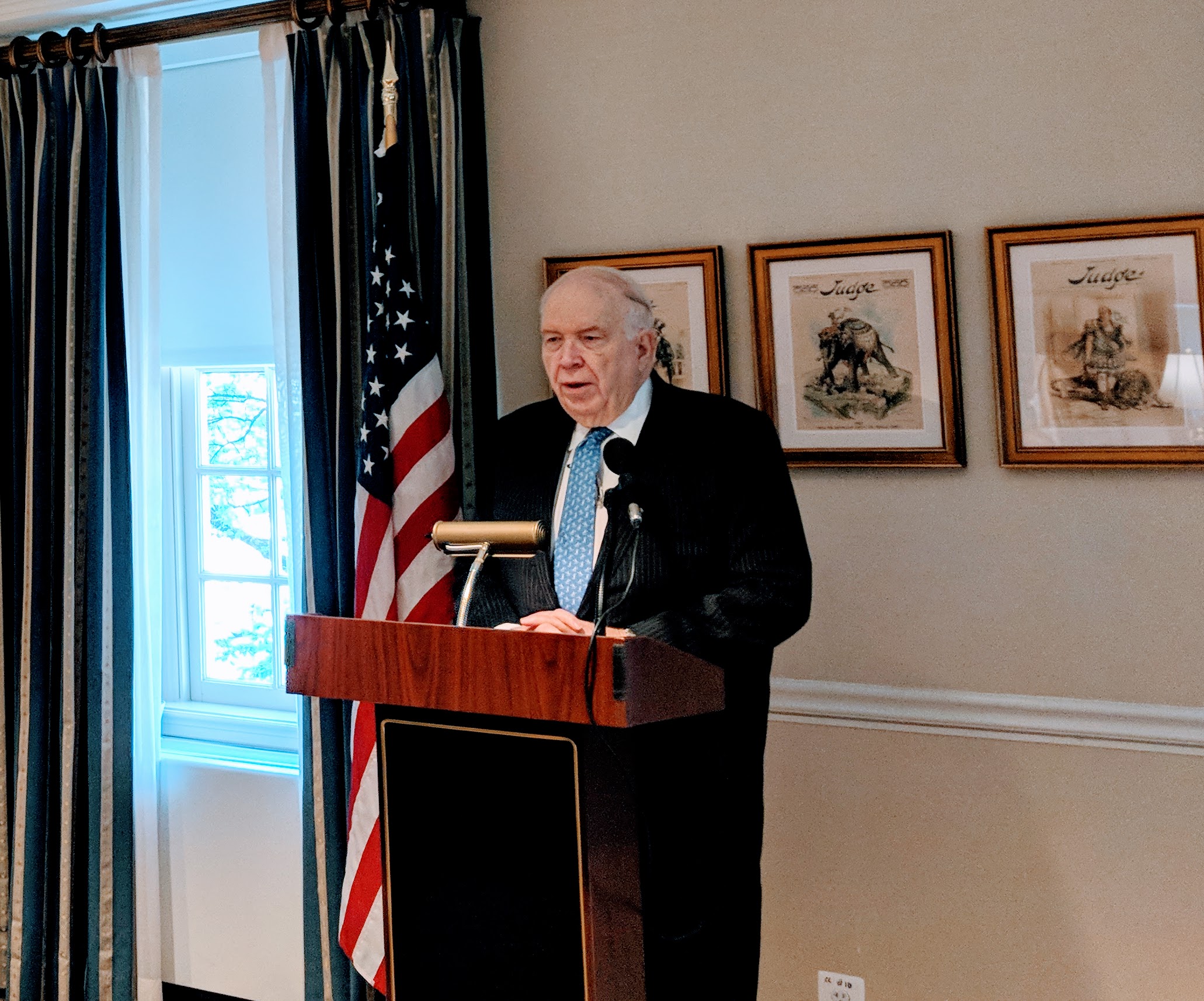
Hud?son Institude Senior Fellow and longtime Washingtin, D.C., economist talks about the economy of deterrence at the Capitol Hill Club, Washington, D.C., May 3. Photo by Gideon Grudo
It’s time to adopt a strategy of “inflicting costs” on Russia and China, says longtime Washington, D.C., economist Bill Schneider.
When the National Defense Strategy was unveiled in January 2018, Secretary of Defense Jim Mattis said the US had to focus on major combat with the two countries, which the strategy refers to as “revisionist powers,” and not just the capability to continue a counterinsurgency, referencing global terrorism. The strategy’s unclassified summary (our only peak into the document since it’s largely classified) accuses the countries of attempting to “shape a world consistent with their authoritarian model—gaining veto authority over other nations’ economic, diplomatic, and security decisions.”
That’s not new, Schneider said Thursday at an AFA Mitchell Institute event on Capitol Hill. Schneider chairs DOD’s Defense Science Board and the Department of State’s Defense Trade Advisory Group, and is currently a senior fellow with the Hudson Institute.
Through the 1970s and early 1980s, a “drought of modernization” in the US helped Soviets gain economic and defense footing, Schneider said, posing “new threats” to America and its allies in Europe. Schneider sees parallels between then and now, having served as Undersecretary of State for Security Assistance, Science, and Technology under President Reagan from 1982 to 1986.
Then, the US took an economic approach to disrupting the Russian economy and economic defense apparatus, sometimes interdicting shipments and trade at foreign airports. It’s harder to do that today when the collateral sits in emails, Schneider said, but added it’s time to step up similar efforts and figure it out. While the Trump administration has posed sanctions on Russia with its executive powers (as opposed to piping them through Congress), the Hill reports “Russia shows no indication of altering its behavior” as a result of those sanctions.
One of the reasons Russia may be shrugging off current US sanctions is its significant oil and gas trade with European countries. In late March, a day after Germany expelled Russian diplomats following the alleged poisoning of a former British spy on British soil, Forbes reported the country approved a gas pipeline to Russia, increasing the country’s dependence on Russian gas. But it’s not just in Europe that Russia banks on its oil production.
What’s “more challenging in the long term,” Schneider added, are emerging economic agreements between Russia and China. For one, as the Washington Post reports, a 2013 deal between China and Kremlin-run oil company Rosneft aims to pipeline the countries with each other and other nations in the market, and is worth $270 billion over 25 years.
Concurrently, Russia supplies more crude oil to China than any other country. Such partnerships between powerhouse nations translate into “the ability to project power,” Schneider added. And these are only the “green shoots” of parallels to past partnerships between the two nations. They’ve shook on dozens of treaty-based cyberspace and military agreements in recent years and collaborate militaristically.
Schneider says all this marks the duo’s “scope” as a power to be reckoned with, adding it’s a “risk to our interests.”
Stopping this growth—even stymying it—is challenging. Chin?a’s got a “worldwide presence,” Schneider says. They’re adept at adopting US tech without paying for it, and proving that stolen intellectual property is being used for military activities is not simple. Despite these inherent hardships, the US needs to intentionally face this problem and address it.
That, Schneider concluded, is the “missing piece” in today’s American national security policy.
